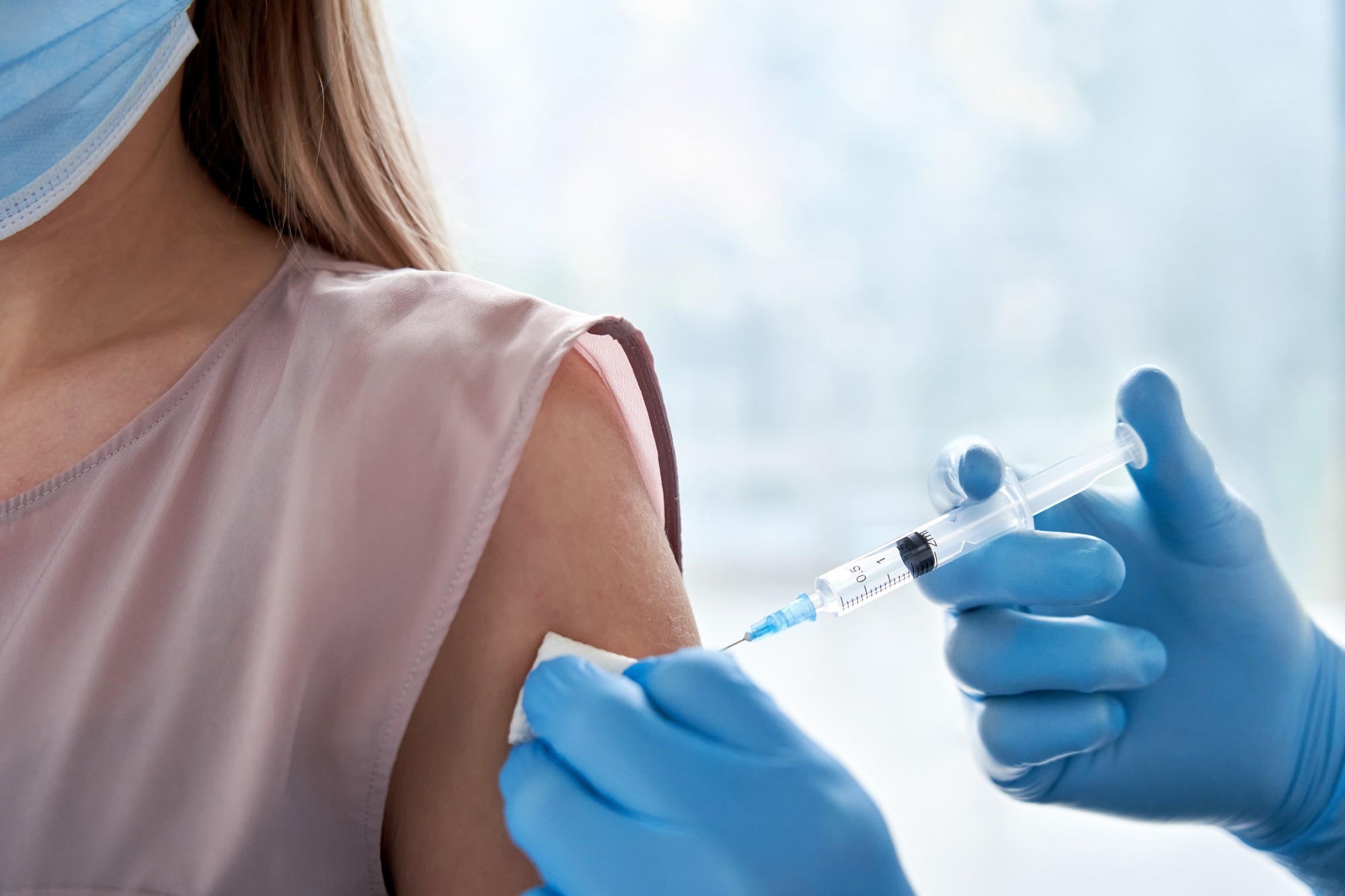The effectiveness of the three-dose coronavirus disease 2019 (COVID-19) vaccination against severe acute respiratory syndrome coronavirus 2 (SARS-CoV-2) and its variants has been described in detail in a recent study. The study report is currently available on the bioRxiv* preprint server.

Background
COVID-19 vaccines developed within a very short period have made it possible to control the ever-increasing pandemic trajectory and unprecedented healthcare damage caused by SARS-CoV-2 globally. Several types of vaccines have been developed, including mRNA-based and viral vector-based vaccines.
With enormous initial success, a decline in vaccine efficacy over time has been experienced by many countries across the world, especially because of the emergence of new and more immunologically potent viral variants.
To improve vaccine efficacy, a third booster vaccination has been introduced in the global COVID-19 vaccination campaigns. Many studies conducted in real-world setups have affirmatively highlighted the overall improvement in vaccine efficacy following booster vaccination.
In the current study, scientists have provided a detailed overview of the humoral and cellular responses induced by three-dose homologous or heterologous COVID-19 vaccination in infection-naïve healthy individuals.
Humoral immune response induced by COVID-19 vaccination
The study was conducted on a total of 20 individuals. Blood samples collected from the participants after the first, second, and third vaccination were tested for anti-spike S1, S2, and receptor-binding domain (RBD) IgG, IgA, and IgM antibodies.
The findings revealed detectable anti-spike IgG levels after the first vaccination. The levels increased significantly after the second vaccines. However, a considerable decline in antibody levels was observed six months after the second vaccination.
The third vaccination helped prevent further decline in antibody levels. Notably, both the second and third vaccination induced similar levels of anti-spike IgG antibodies in the blood.
Regarding IgA-specific anti-spike antibodies, a significantly increased level was observed in the blood after the second and third vaccination. However, the antibody levels varied considerably among participants.
An induction in the IgM-specific antibody level was observed in the blood after the first vaccination, with anti-RBD antibodies showing higher levels than anti-S1 and anti-S2 antibodies.
Antibody-inhibitory capacity was assessed to determine the ability of anti-SARS-CoV-2 antibodies to inhibit viral spike–host angiotensin-converting enzyme 2 (ACE2) interaction. The findings revealed a significant induction in antibody-inhibitory capacity after the third vaccination against wildtype SARS-CoV-2 and its variants alpha, beta, gamma, delta, and omicron. However, the neutralizing efficacy of antibodies induced by the third vaccination was relatively lower against the omicron variant.
Regarding type and regimen of vaccination, no significant difference in antibody levels and antibody-inhibitory capacity was observed after the third dose between recipients of homologous (three doses of mRNA vaccine) and heterologous vaccination (one dose of adenovirus vector vaccine followed by two doses of mRNA vaccine).
Cellular immune response induced by COVID-19 vaccination
A high individual variability in the absolute number of B and T cell subsets was observed among recipients of COVID-19 vaccination. Notably, the development of spike-specific memory T cells was observed after consecutive COVID-19 vaccinations.
After the first vaccination, recipients of heterologous vaccination exhibited a higher proportion of memory T cells and B cells than recipients of homologous vaccination. However, no such difference was observed following the second and third vaccinations.
The dynamics of T cell response were further assessed in individuals with three-dose vaccination with and without breakthrough SARS-CoV-2 infection. Both groups showed effective memory T cell formation. However, a higher secretion of interferon-gamma was observed in individuals with breakthrough infection.
Notably, individuals with breakthrough infection showed a higher ability than infection-naïve vaccinated individuals to secrete a wide range of cytokines and chemokines associated with T cell activation.
Overall, these findings indicate that SARS-CoV-2 breakthrough infections induce broader and more specific T cell response compared to triple vaccination.
Study significance
The study highlights the effectiveness of three-dose COVID-19 vaccination against SARS-CoV-2 and its variants. The third booster dose of COVID-19 vaccines is highly effective in inducing robust humoral and cellular immune responses in infection-naïve individuals.
The third vaccination is particularly crucial to increase the levels of neutralizing antibodies against a wide-variety of viral variants, including omicron.
Importantly, the study indicates that homologous and heterologous vaccinations work similarly after third dose in terms of inducing humoral and cellular immune responses.
*Important notice
bioRxiv publishes preliminary scientific reports that are not peer-reviewed and, therefore, should not be regarded as conclusive, guide clinical practice/health-related behavior, or treated as established information.
- Ruhl L. (2022). Triple COVID-19 vaccination induces humoral and cellular immunity to SARS-CoV-2 with cross-recognition of the Omicron variant and IgA secretion. BioRxiv. doi: https://doi.org/10.1101/2022.09.22.508999 https://www.biorxiv.org/content/10.1101/2022.09.22.508999v1.full.pdf
Posted in: Medical Science News | Medical Research News | Disease/Infection News
Tags: ACE2, Adenovirus, Angiotensin, Antibodies, Antibody, Blood, Cell, Chemokines, Coronavirus, Coronavirus Disease COVID-19, covid-19, Cytokine, Efficacy, Enzyme, Healthcare, Homologous, Immune Response, Interferon, Omicron, Pandemic, Receptor, Respiratory, SARS, SARS-CoV-2, Severe Acute Respiratory, Severe Acute Respiratory Syndrome, Syndrome, Vaccine, Viral Vector

Written by
Dr. Sanchari Sinha Dutta
Dr. Sanchari Sinha Dutta is a science communicator who believes in spreading the power of science in every corner of the world. She has a Bachelor of Science (B.Sc.) degree and a Master's of Science (M.Sc.) in biology and human physiology. Following her Master's degree, Sanchari went on to study a Ph.D. in human physiology. She has authored more than 10 original research articles, all of which have been published in world renowned international journals.
Source: Read Full Article
